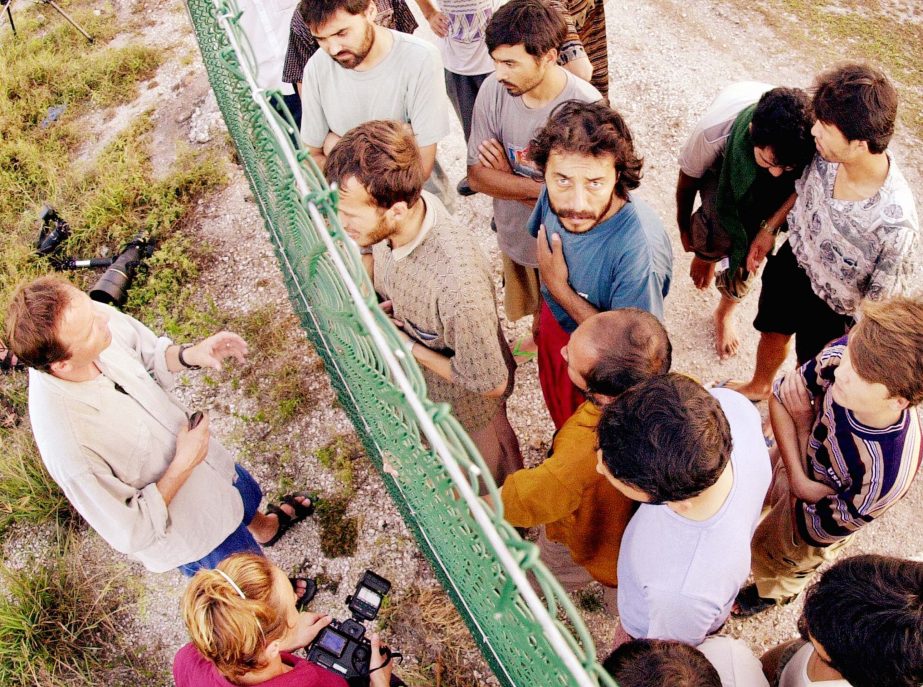
AP, Sydney :
Human rights groups accused Australia on Wednesday of deliberately ignoring the alleged abuse of asylum seekers being held at a remote Pacific island detention facility in a bid to deter future refugees from trying to reach the country by boat.
A scathing joint report by Human Rights Watch and Amnesty International said detainees on the Pacific island nation of Nauru, where Australia sends asylum seekers, are routinely denied critical medical care, frequently attempt suicide and endure physical assaults by locals on the island.
“Australia’s policy of exiling asylum seekers who arrive by boat is cruel in the extreme,” Anna Neistat, senior director for research at Amnesty International, said in a statement. “Few other countries go to such lengths to deliberately inflict suffering on people seeking safety and freedom.”
Australia’s Department of Immigration and Border Protection criticized the rights groups for not consulting with the government while preparing the report.
“We would strongly encourage Amnesty International to contact the department before airing allegations of this kind,” the department said in a statement. “The department strongly refutes many of the allegations in the report.”
The department did not respond to a request seeking details on what parts of the report it was refuting.
Australia refuses to accept any asylum seekers who attempt to reach its shores by boat. Instead, it pays Nauru and the Pacific island nation of Papua New Guinea to hold them – often for years.
Reports of abuse, miserably hot and crowded living conditions, and frequent suicide attempts at the detention camps have plagued Australia for years; in April, an Iranian refugee on Nauru died after setting himself on fire. Human rights groups have long called on Australia to abandon its offshore detention policy, calling the practice a violation of the country’s international human rights obligations.
Australia argues that the policy has saved lives by removing the incentive for migrants to attempt the dangerous and often deadly ocean crossing from Indonesia to Australia in rickety boats.
Human rights groups accused Australia on Wednesday of deliberately ignoring the alleged abuse of asylum seekers being held at a remote Pacific island detention facility in a bid to deter future refugees from trying to reach the country by boat.
A scathing joint report by Human Rights Watch and Amnesty International said detainees on the Pacific island nation of Nauru, where Australia sends asylum seekers, are routinely denied critical medical care, frequently attempt suicide and endure physical assaults by locals on the island.
“Australia’s policy of exiling asylum seekers who arrive by boat is cruel in the extreme,” Anna Neistat, senior director for research at Amnesty International, said in a statement. “Few other countries go to such lengths to deliberately inflict suffering on people seeking safety and freedom.”
Australia’s Department of Immigration and Border Protection criticized the rights groups for not consulting with the government while preparing the report.
“We would strongly encourage Amnesty International to contact the department before airing allegations of this kind,” the department said in a statement. “The department strongly refutes many of the allegations in the report.”
The department did not respond to a request seeking details on what parts of the report it was refuting.
Australia refuses to accept any asylum seekers who attempt to reach its shores by boat. Instead, it pays Nauru and the Pacific island nation of Papua New Guinea to hold them – often for years.
Reports of abuse, miserably hot and crowded living conditions, and frequent suicide attempts at the detention camps have plagued Australia for years; in April, an Iranian refugee on Nauru died after setting himself on fire. Human rights groups have long called on Australia to abandon its offshore detention policy, calling the practice a violation of the country’s international human rights obligations.
Australia argues that the policy has saved lives by removing the incentive for migrants to attempt the dangerous and often deadly ocean crossing from Indonesia to Australia in rickety boats.

